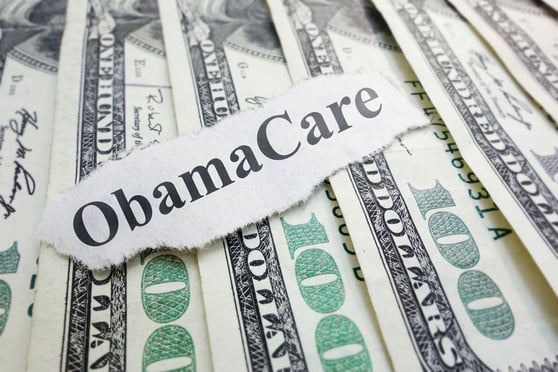The Republican tax plans are suddenly looking a lot more likehealth-care bills, with provisions that mayaffect coverage and increase medical expenses for millions of families.
|The House version of the tax bill, which President Donald Trumpendorsed on Tuesday, would end a deduction that allows families ofdisabled children and elderly people to write off large medicalexpenses. The Senate plan would repeal the Obamacare requirementthat most Americans carry insurance, a move that insurers promisewould raise premiums in the nationwide individual insurancemarket.
|The provisions would help offset the cost of large tax cuts forcorporations and individuals. But the move has sparked a new waveof opposition from the health-care industry and others who areconcerned about its impact -- the same political headwinds thattanked Republican efforts to repeal the Affordable Care Act earlierthis year.
|Either proposal, if signed into law, “could be devastating forsome families with disabilities,” said Kim Musheno, vice presidentof public policy at the Autism Society, a Bethesda, Maryland,organization that advocates for people with autism. “Familiesdepend on that deduction. And if they deal with the individualmandate, that’s going to cut 13 million people from their healthcare,” she said, citing a Congressional Budget Office estimate.
|Republicans and some conservative groups, though, argue thatremoving the penalty for uninsured individuals would represent atax cut for many low-income people who pay it now. Americans forTax Reform, the group led by anti-tax crusader Grover Norquist,said that InternalRevenue Service data from tax year 2015 show that 79 percent ofhouseholds that paid the penalty earned less than $50,000 ayear.
|Most Americans already think the tax legislation is designed tobenefit the rich and oppose the bill by a two-to-one margin,according to a Quinnipiac University poll released on Wednesday.The survey was conducted between Nov. 7 and Nov. 13 -- before therepeal of the Obamacare mandate was introduced -- and has a marginof error of 3 percentage points. Some of the details in both taxplans have changed since the survey, and the Senate tax-writingcommittee is still working on its draft.
|Republican concerns
Few Republicans have spoken out about the House bill’s repeal ofthe medical-expense break. The bill faces a vote on the House floorThursday. But some criticism has begun to surface as advocacygroups including the AARP and the American CancerSociety have highlighted the harm the House bill could have onfamilies battling diseases and on the elderly. People with tens ofthousands of dollars in annual medical expenses often rely on thetax deduction to make ends meet.
|Representative Walter Jones, a North Carolina Republican, saidWednesday he’ll vote against the House bill in part because iteliminates the deduction for out-of-pocket medical expenses.
|“There are a lot of seniors in my district and this is life anddeath for them,” he said.
|The deduction is allowed under current law if medical expensesexceed 10 percent of a taxpayer’s adjusted gross income. Almost 9million taxpayers deducted about $87 billion in medical expensesfor the 2015 tax year, according to the IRS.
|||Representative Greg Walden, an Oregon Republican who chairs theEnergy and Commerce Committee, said some of his constituents wholive in expensive elder-care facilities could be harmed if thededuction is scrapped.
|“I think it’s one we have to continue to massage a bit,” hesaid. “There’s a lot of things out there and there’s maybe going tobe an opportunity to adjust some of them.”
|He declined to elaborate.
|Obamacare repeal
On the other side of the Capitol, Senate Republican leaders’sudden decision to add a partial Obamacare repeal to their bill hasenergized Democratic opposition.
|“You don’t fix the health insurance system by throwing it into atax bill and causing premiums to go up 10 percent,” Senator SherrodBrown, an Ohio Democrat, told reporters Wednesday.
|Were the ACA’s insurance mandate repealed absent a new policy tocompel the purchase of coverage, the CBO projects that premiumswould rise 10 percent for people who buy insurance on their own andmore than 13 million Americans would lose or drop theircoverage.
|But a reduction in the number of people with insurance alsotranslates to less taxpayer money spent to provide subsidies forpremiums under the ACA. Ending the requirement as of 2019 wouldsave the government an estimated $318 billion, helping to offsetthe cost of lowering the corporate tax rate.
|In addition, the Senate’s tax plan could trigger sharp cuts toMedicare and other programs in order to meet budget deficit rules,according to CBO.
|Easy ads
The move to target Obamacare comes after Republicans lostelections in Virginia and other states earlier this month. Healthcare was a significant factor in those races and Republicans willface punishing campaign ads if they try to chip away at Obamacareor end the medical-expense deduction while cutting taxes, saidpolitical analyst David Axelrod, a former top adviser to PresidentBarack Obama.
|“The thing that makes it more of a potent issue is that it’s allbeing done to facilitate what essentially is a massive corporatetax cut and an individual tax cut that’s skewed to wealthyAmericans," he said in an interview. “You don’t have to work veryhard to make those ads.”
|The White House argues that the ACA’s insurance mandate isn’tpopular and disproportionately affects low- and middle-incomeAmericans who are forced to buy insurance that may be moreexpensive than they can afford.
|“The President’s priorities for tax reform have been clear fromthe beginning: make our businesses globally competitive, anddeliver tax cuts to the middle class,” White House spokesman RajShah said in a statement. “He is glad to see the Senate isconsidering including the repeal of the onerous mandates ofObamacare in its tax reform legislation and hopes that thosesavings will be used to further reduce the burden it has placed onmiddle-class families."
|‘Cut top rate’
Trump, though, has said proceeds from repealing the insurancemandate should be used to cut taxes even further for wealthypeople.
|“How about ending the unfair & highly unpopular IndivMandate in OCare & reducing taxes even further?” Trump saidMonday in a tweet. “Cut top rate to 35% w/all of the rest going tomiddle income cuts?”
|Like Republicans’ failed attempts to repeal the ACA, the taxplan is amassing a growing list of opponents from the world ofmedicine.
|Insurers, hospital groups and disability advocates have spokenout forcefully against the health-care proposals in the bill.Hospitals and insurance groups wrote a letter to Congressionalleaders on Tuesday warning of dire health-care outcomes if the taxmeasure becomes law.
|“Repealing the individual mandate without a workable alternativewill reduce enrollment, further destabilizing an already fragileindividual and small group health insurance market on which morethan 10 million Americans rely,” said the letter, signed by sixhealth-care groups, including the American Hospital Association andAmerica’s Health Insurance Plans.
|Copyright 2018 Bloomberg. All rightsreserved. This material may not be published, broadcast, rewritten,or redistributed.
Complete your profile to continue reading and get FREE access to BenefitsPRO, part of your ALM digital membership.
Your access to unlimited BenefitsPRO content isn’t changing.
Once you are an ALM digital member, you’ll receive:
- Critical BenefitsPRO information including cutting edge post-reform success strategies, access to educational webcasts and videos, resources from industry leaders, and informative Newsletters.
- Exclusive discounts on ALM, BenefitsPRO magazine and BenefitsPRO.com events
- Access to other award-winning ALM websites including ThinkAdvisor.com and Law.com
Already have an account? Sign In
© 2024 ALM Global, LLC, All Rights Reserved. Request academic re-use from www.copyright.com. All other uses, submit a request to [email protected]. For more information visit Asset & Logo Licensing.








